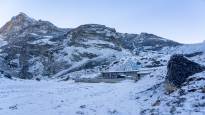According to a new study, the melting of the glacier lowers the temperatures around the mountain range – at least locally and for a while.
The Himalayan glaciers are currently melting at an accelerating rate. A new study according to the melting of the mountain ice cover may also have a slowing effect on climate change, US news channel CNN reports.
Researchers investigating the effects of climate change in the Himalayas have discovered a phenomenon where higher temperatures than usual cause katabatic winds that blow cold air down from the mountains.
– The warming climate increases the temperature difference between the air in the Himalayas and the air on the surface of the ice itself, says the Austrian who led the international research group Francesca Pelliciotti for CNN.
According to him, this creates a turbulent flow of heat, which further cools the air above the switch.
– When cold and dry air cools and condenses, it starts to descend. The air mass flows down the slopes of the mountains and lowers the temperatures in the ecosystems located under the mountains.
According to Pelliciotti, the findings of the research team may be valid in different mountains worldwide.
Katabatic winds are very common in the mountains in spring. Melting snow and ice requires energy, and the consumption of energy leads to the cooling of the surrounding air. Usually the cooling is due to the setting of the sun, but in this situation the air is cooling high in the mountains due to melting.
CNN reported in June, that the Himalayan ice cover melted 65 percent faster in the 2010s than in the previous decade. By the end of the century, it is feared that up to four fifths of the glaciers of the world’s highest mountain range will disappear.
Although cold winds have been found to slow down climate change locally, they are not believed to stop global warming permanently.
– The cooling of the climate is local, and it is probably not enough to combat climate change or to preserve the glaciers, a participant in the study Thomas Shaw tells.
– Even if the glaciers don’t last forever, they might still help preserve their environment for a while, Pelliciotti says.
